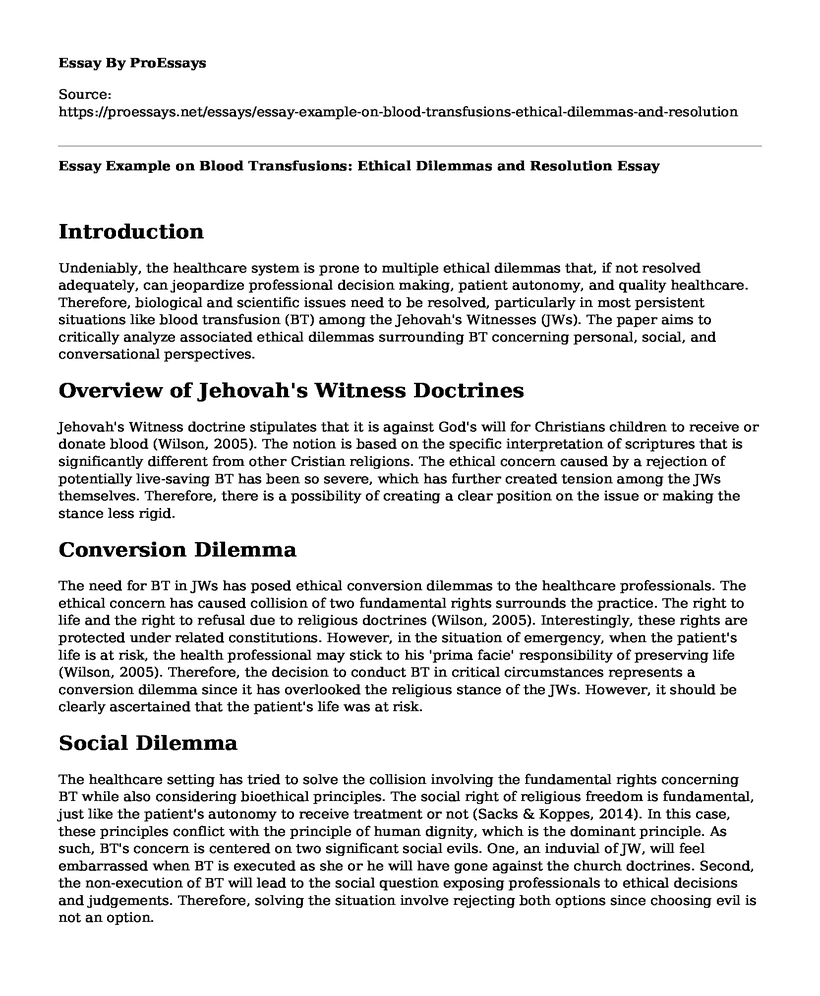Introduction
Undeniably, the healthcare system is prone to multiple ethical dilemmas that, if not resolved adequately, can jeopardize professional decision making, patient autonomy, and quality healthcare. Therefore, biological and scientific issues need to be resolved, particularly in most persistent situations like blood transfusion (BT) among the Jehovah's Witnesses (JWs). The paper aims to critically analyze associated ethical dilemmas surrounding BT concerning personal, social, and conversational perspectives.
Overview of Jehovah's Witness Doctrines
Jehovah's Witness doctrine stipulates that it is against God's will for Christians children to receive or donate blood (Wilson, 2005). The notion is based on the specific interpretation of scriptures that is significantly different from other Cristian religions. The ethical concern caused by a rejection of potentially live-saving BT has been so severe, which has further created tension among the JWs themselves. Therefore, there is a possibility of creating a clear position on the issue or making the stance less rigid.
Conversion Dilemma
The need for BT in JWs has posed ethical conversion dilemmas to the healthcare professionals. The ethical concern has caused collision of two fundamental rights surrounds the practice. The right to life and the right to refusal due to religious doctrines (Wilson, 2005). Interestingly, these rights are protected under related constitutions. However, in the situation of emergency, when the patient's life is at risk, the health professional may stick to his 'prima facie' responsibility of preserving life (Wilson, 2005). Therefore, the decision to conduct BT in critical circumstances represents a conversion dilemma since it has overlooked the religious stance of the JWs. However, it should be clearly ascertained that the patient's life was at risk.
Social Dilemma
The healthcare setting has tried to solve the collision involving the fundamental rights concerning BT while also considering bioethical principles. The social right of religious freedom is fundamental, just like the patient's autonomy to receive treatment or not (Sacks & Koppes, 2014). In this case, these principles conflict with the principle of human dignity, which is the dominant principle. As such, BT's concern is centered on two significant social evils. One, an induvial of JW, will feel embarrassed when BT is executed as she or he will have gone against the church doctrines. Second, the non-execution of BT will lead to the social question exposing professionals to ethical decisions and judgements. Therefore, solving the situation involve rejecting both options since choosing evil is not an option.
Personal Dilemma
The personal dilemma involves a patient's autonomy to accept or reject treatment. Besides the protection of JWs fundamental rights, healthcare professionals can count certain bioethical principles that guarantee the patients' wellbeing. The principle of 'defense to live' maybe excise at a personal level by the patient whose life maybe at risk. However, the professional may overlook this dilemma and conduct BT based on the principle of moral conscience (Alexi-Meskishvili et al, 2004). The principle allows the professional to intervene provided risk and benefits of BT had been previously assessed.
Conclusion
In conclusion, JWs are against the practice of BT even at a point of death. Accepting the procedure is against their religious doctrine, which may expose the victim to religious consequences. Therefore, the aforementioned ethical dilemmas can only be solved through alternative hemotherapies. These would prevent collison between the fundamental right to life and freedom of conscience and belief.
References
Alexi-Meskishvili, V., Stiller, B., Koster, A., Bottcher, W., Hubler, M., Photiadis, J., ... & Hetzer, R. (2004). Correction of congenital heart defects in Jehovah's Witness children. The Thoracic and cardiovascular surgeon, 52(03), 141-146.
Sacks, D. A., & Koppes, R. H. (2014). Blood transfusion and Jehovah's Witnesses: Medical and legal issues in obstetrics and gynecology. American journal of obstetrics and gynecology, 154(3), 483-486.
Wilson, P. (2005). Jehovah's Witness children: when religion and the law collide. Paediatric Nursing, 17(3), 34.
Cite this page
Essay Example on Blood Transfusions: Ethical Dilemmas and Resolution. (2023, Apr 07). Retrieved from https://proessays.net/essays/essay-example-on-blood-transfusions-ethical-dilemmas-and-resolution
If you are the original author of this essay and no longer wish to have it published on the ProEssays website, please click below to request its removal:
- The Scope of Immunization Coverage Essay
- Potential Ethical Considerations on International Thermonuclear Experimental Reactor (ITER) Project
- Mental and Mental Health Nurse Practitioner in Texas Paper Example
- Accidents Among the Elderly in Nursing Homes Essay
- Simulation-Based Nursing Education: Exploring Benefits & Challenges - Essay Sample
- Conflict Management in Nursing: Strategies for Leaders - Essay Sample
- Essay Example on Supplements: Enhancing Exercise & Athletic Performance







